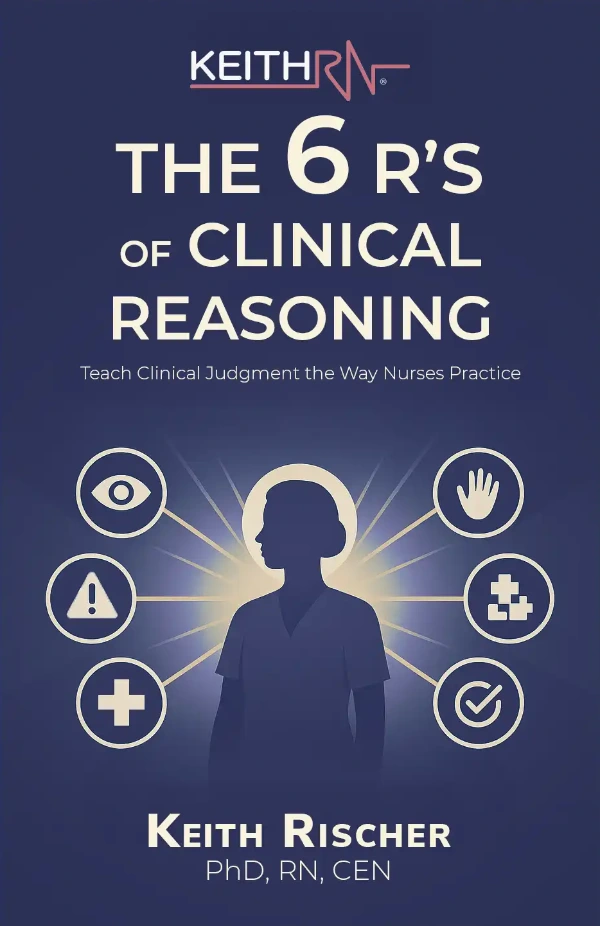
In last week’s blog I proposed three reflective questions that nurse educators must ask and reflect upon to improve and strengthen student learning to determine what worked and what did not in the class or clinical last semester or school year.
But it is not enough to personally reflect. Nurse educators must also actively solicit the feedback of their students to guide and strengthen this needed reflection.
I have developed three simple questions to ask students that can give students a voice in strengthening their own education!
My Story
I recently taught a large NCLEX® review course that had nursing students from across the Twin Cities attend. Most were tired but thankful to have completed their program and overcome the next hurdle which is to pass the NCLEX®.
I asked this representative sample of nursing students three questions that would identify what they perceived as current weaknesses, strengths, and what they would do to improve nursing education.
As I reviewed the responses, several themes became apparent that I believe are relevant not only for nurse educators here in the Twin Cities, but must be considered by nurse educators across the country.
But first, here are the three questions I asked on my written anonymous survey:
- What was your greatest struggle/frustration as a nursing student?
- What was your greatest benefit/take away as a nursing student?
- What would you do to improve nursing education?
What follows are the themes as well as specific comments that students shared. As a nurse educator, reflect and see if the shoe fits for any of their comments and concerns so you can utilize this feedback and do what is needed to facilitate needed change to your content and program.
Question #1: What was your greatest struggle/frustration as a nursing student?
Though Educating Nurses: A Call for Radical Transformation came out over six years ago and addressed the importance of contextualizing content to practice as well as decreasing the amount of content to strengthen student learning because they acquire a superficial learning of a broad body of content but not the deep learning of what is most important.
It appears that little change has been made on this front.
Would you be surprised that the greatest frustration of nursing students could be summarized in three letters: TMI!
Students also recognized the value of contextualizing content to practice, but their programs did not consistently do so.
Here are comments that represent the essence of their current struggle:
- So much to learn in a short period of time
- I feel like I really study the content, but then struggle to recall and apply the information
- Information overload! The amount of content to know was overwhelming!
- Not teaching patho and theory together. They were completely separated
- Finding the time to thoroughly learn the extensive amount of content while dealing with an extensive amount of pointless assignments and papers.
Question #2: What was your greatest benefit/take away as a nursing student?
Though students had numerous struggles, they also were quick to point out the numerous benefits and personal growth the experienced as a nursing student.
Here are examples that capture the essence of what most students took away from their nursing education:
- All clinical experience as it provided me with hands on learning
- Hard work pays off!
- Instructor support and encouragement is needed and so helpful!
- Learning how to think critically. I grew both intellectually and emotionally and the friendships I made were a huge take away!
- The importance of being both adaptable and flexible. If I do that I can overcome any obstacle!
Question #3: What would you do to improve nursing education?
Though students had a wide variety of responses, the most common theme was the lack of time in the clinical setting and needing more of this to strengthen their skills as a nurse.
Here is a sample of student resources on this question:
- Standardized test questions including NCLEX® type format. Faculty would write questions based on their experience and not on what is always in the textbook.
- Greater emphasis on pharmacology, pathophysiology, learning clinical reasoning, and clinical judgment
- Less emphasis on APA on papers and more time in the clinical setting! Everything that is securely solidified in my mind was due to clinical experience!
- Focus on what is most important instead of learning rather than an overload of all information
- Provide more opportunities for simulation as well is patient care experiences in all areas but especially peds and OB
- Less time spent on papers and more time in clinical to ensure competency!
- Oversee the ability of instructors to teach. Some great nurses struggle to teach. Improve consistency between faculty on the same team.
Transformation Still Needed
Based on my personal experiences as a nurse educator as well as what is documented from the research contained in Educating Nurses (Benner, Leonard, Sutphen, & Day, 2010), the reflections and comments of these students need to be considered and taken seriously.
Though there are some things that nurse educators are unable to control such as the amount of clinical time that most students identified as a problem, every nurse educator must embrace the opportunity to change what they can.
For example, one of the paradigm shifts advocated in Educating Nurses (Benner, Leonard, Sutphen, & Day, 2010), is to integrate and bring classroom and clinical learning together.
Bring Clinical to Class!
If your program cannot increase the amount of clinical hours then bring CLINICAL to CLASS!
The unique clinical reasoning case studies that I have developed and refined over the last four years have been found by educators across the country to be an effective pedagogy to bring and realize this aspect of needed transformation in nursing education!
I am currently working on additional tools and shorter case studies that emphasize clinical reasoning and will finalize just in time for fall.
In Closing
As I have spoken across the country on practical ways to bring transformation and needed change to nursing education, there is one barrier that educators agree is one of the most prevalent…
Faculty who are unable or unwilling to change. Based on these student reflections, needed change has yet to be realized.
Just as a journey of 1000 miles begins with the first step, if you are still struggling to take that needed first step, do what other educators have done and use the recommendations found in Educating Nurses and the resources found on KeithRN to decrease your content, and emphasize active learning as well as clinical reasoning.
I hope you’ll take that big and important first step today and bring needed change next time you teach!
What do you think?
What barriers do you experience that make it difficult to bring needed change to your content?
Comment below and let the conversation begin!
RELEVANT YouTubes to Check Out!
If you are a visual learner, I have a YouTube channel THINK Like a Nurse that has videos I have posted that emphasizes NEED to know content for students and nurse educators!
- Just Posted this week! Comprehending Cardiac Medications-Beta Blockers
- Comprehending Cardiac Medications-ACE Inhibitors
- Comprehending Cardiac Output
References
Benner, P., Sutphen, M., Leonard, V., & Day, L. (2010). Educating nurses: A call for radical transformation. San Francisco, CA: Jossey-Bass.
Keith Rischer – PhD, RN, CEN
As a nurse with over 35 years of experience who remained in practice as an educator, I’ve witnessed the gap between how nursing is taught and how it is practiced, and I decided to do something about it! Read more…
The Ultimate Solution to Develop Clinical Judgment Skills
KeithRN’s Think Like a Nurse Membership
Access exclusive active learning resources for faculty and students, including KeithRN Case Studies, making it your go-to resource.




